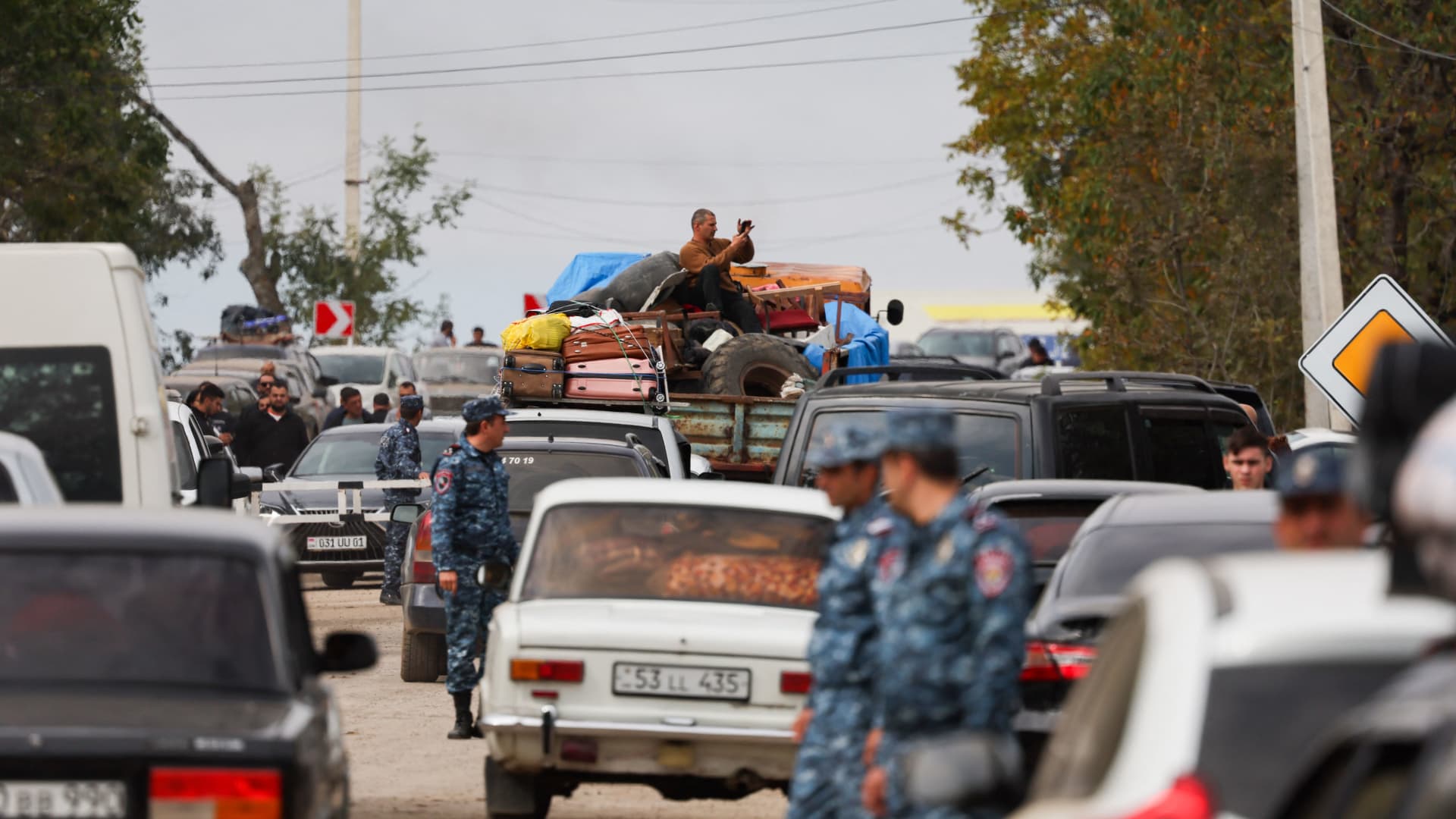Armenian police officers walks near refugees as they queue in vehicles near the border town of Kornidzor, arriving from Nagorno-Karabakh, on September 26, 2023.
Alain Jocard | Afp | Getty Images
Thousands of ethnic Armenians on Tuesday fled their homes in the breakaway enclave of Nagorno-Karabakh, as Armenia’s Prime Minister Nikol Pashinyan publicly blamed Russia for failing to ensure the country’s security.
The mass exodus comes after a lightning military operation by Azerbaijan last week that saw it take full control of the region that has endured more than three decades of conflict.
The 24-hour offensive ratcheted up fears of major unrest throughout the Caucasus — the border region between southeast Europe and west Asia.
The U.S. has called for Azerbaijan to maintain a ceasefire and “take concrete steps” to protect the rights of civilians in Nagorno-Karabakh.
The landlocked territory of Nagorno-Karabakh declared independence from Azerbaijan in 1991 and, with the support of Armenia, has fought two wars with Azerbaijan in the space of 30 years. The territory is currently home to an estimated 120,000 ethnic Armenians.
Hundreds of cars, buses and open-top trucks were seen Tuesday snaking their way through the last Azerbaijani checkpoint to enter Armenia via the so-called Lachin Corridor, a mountain road that connects Armenia and Nagorno-Karabakh.
The first convoys of civilians leaving the region began on Sunday. As of Tuesday morning, at least 13,350 people were estimated to have entered Armenia from Nagorno-Karabakh, according to the Armenian government.
A refugee waits in a car with her baby as she waits to cross the border, leaving Karabakh to Armenia, in Lachin, on September 26, 2023.
Emmanuel Dunand | Afp | Getty Images
It said it would provide accommodation to all those fleeing Nagorno-Karabakh who have no place to live.
Separately, at least 20 people were reported to have been killed on Monday in an explosion at a fuel depot in Nagorno-Karabakh, according to local Armenian authorities. The cause of the blast remains unclear.
Local human rights official Gegham Stepanyan said via X, formerly known as Twitter, that the number of people injured in the explosion exceeded 200.
‘Unacceptable insinuations’
Armenia, which has typically looked to Russia as a security guarantor, said Azerbaijan’s military operation last week was an attempt to ethnically cleanse Nagorno-Karabakh, a charge it denies.
Speaking on Sunday in an address to the nation, Armenia’s prime minister said the likelihood was rising that people would seek to flee the Nagorno-Karabakh region “as the only way to save their lives and identity,” Reuters reported.
“Responsibility for such a development of events will fall entirely on Azerbaijan, which adopted a policy of ethnic cleansing, and on the Russian peacekeeping contingent in Nagorno-Karabakh,” Pashinyan said. He added that the government’s strategic partnership with Moscow was not enough to protect the country’s external security.
Russia on Monday hit back against Pashinyan’s assertions, saying his address “contained unacceptable insinuations against Russia and can only elicit repudiation.”
“The most recent utterances by Nikol Pashinyan confirm our earlier conclusions that the processes driven by Western influence and encouraged by official Yerevan are systemic rather than sporadic and detrimental to their own country and our alliance,” Russia’s Foreign Ministry said in a statement.
Despite decades of security backing from Russia, Armenian authorities have grown increasingly frustrated with what they perceive as a lack of willingness from the Kremlin to support the country.
Russia, alongside Armenia, is a member of the Collective Security Treaty Organization. Formed in 2002, the Moscow-led security bloc is a military alliance composed of six post-Soviet states. Like NATO, the CSTO is based on the principle of collective defense, meaning that an attack on one member is recognized as an attack on all members.
Azerbaijan soldiers regulate the traffic as refugees wait in their cars to leave Karabakh for Armenia, at the in Lachin border, on September 26, 2023.
Emmanuel Dunand | Afp | Getty Images
Armenia’s prime minister suggested earlier in the year that the country was considering withdrawing from the CSTO due to a lack of support from Russia. More recently, Pashinyan admitted that it had been a strategic mistake to depend solely on the Kremlin to guarantee the country’s security.
Analysts told CNBC last week that Pashinyan’s grip on power was being “weakened by the minute” over the Nagorno-Karabakh crisis, particularly given that the prime minister does not appear to enjoy either internal or external support.

